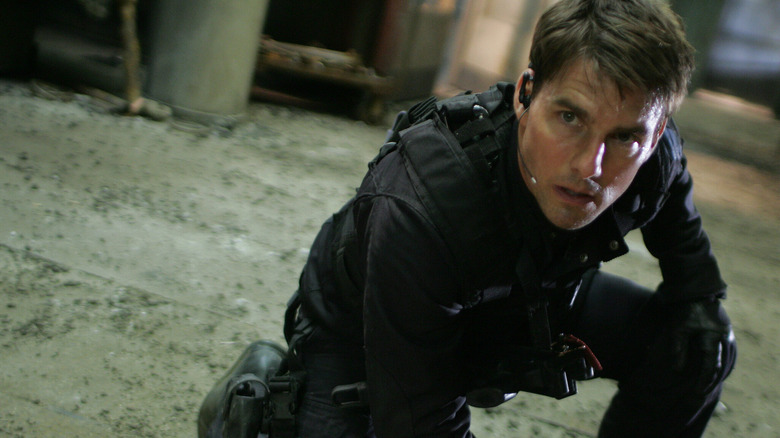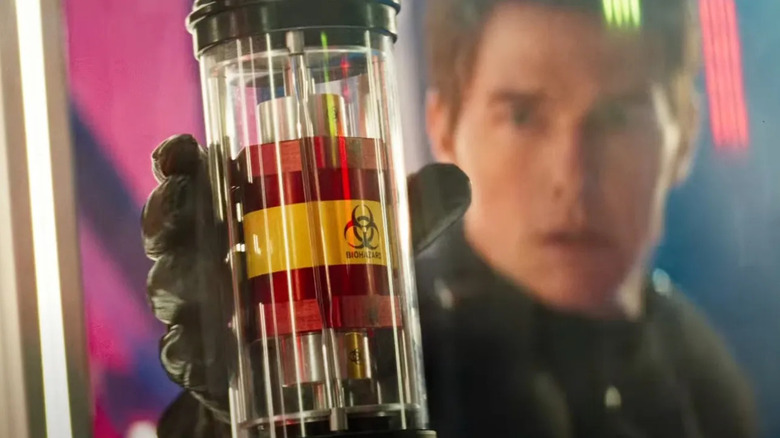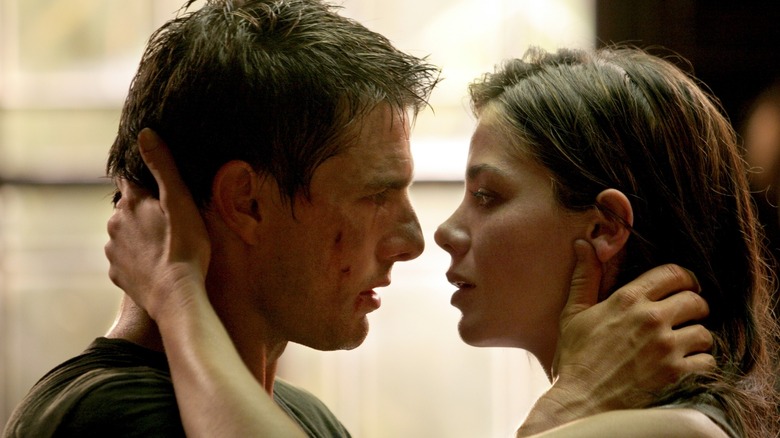The Final Reckoning Makes Mission: Impossible 3 One Of The Most Important Films In The Franchise
This article contains spoilers for "Mission: Impossible — The Final Reckoning."
It's a pastime that occurs in cinephile and fandom circles every time a new installment of a beloved franchise is released: the ranking. With "Mission: Impossible — The Final Reckoning" premiering in theaters this month, the debate has been raging online about "M:I" series rankings, for where some franchises have a more obvious pick of unimpeachable installments, the "Mission" films have maintained a high degree of quality entertainment. This means that there's not a clear contender for the top spot, as everything from "Fallout" to the original "Mission: Impossible" to "Ghost Protocol" have been vying for the gold.
There is, however, a consensus on the two films which appear at the bottom of most fans' lists. The first is John Woo's eternally (and, in my opinion, unfairly) maligned "Mission: Impossible 2." The second is J.J. Abrams' "Mission: Impossible III," a movie which felt like it was better received upon its initial release (likely because it was seen as a minor course-correct after the perceived missteps of "M:I-2"), but has now fallen into disfavor. The primary reason for this seems to be due to Abrams' present-day reputation as the director who dropped the "Star Wars" ball with "The Rise of Skywalker," an opinion that dovetails with a longstanding snobbishness toward his filmmaking tendencies (yes, we know he loves lens flares; no, they don't inherently make a film bad). The consensus appears to be that "M:I III" is a movie which a lot of fans of the series would rather skip.
Bad news for these folks: "M:I III" has become a key text for Christopher McQuarrie's tenure on the "M:I" films, with "Fallout" dedicating a chunk of its runtime to resolving the relationship between Ethan Hunt (Tom Cruise) and ex-wife Julia Meade (Michelle Monaghan). McQuarrie's "The Final Reckoning" has now doubled down on the "M:I III" connection, taking an intentionally dangling plot thread from that film and tying it up in a way that means the third installment has now become one of the most important movies in the franchise.
The Final Reckoning makes M:I III a crux point of the entire series
Just about every action/adventure movie (and certainly every spy film) makes use of what Alfred Hitchcock dubbed the MacGuffin, an object which the characters in a movie are highly concerned with obtaining but which the audience needn't (or sometimes even shouldn't) care that deeply about. Abrams, as evidenced by his infamous "mystery box" ethos, took that second interpretation to heart, making a habit out of creating MacGuffins which deliberately keep the audience (and many characters) in the dark, diluting the trope to its most basic form while allowing the audience's imaginations to run rampant.
"M:I III" is the most succinct example of this: in it, Ethan and his team are tasked with obtaining a weapon known only by its code name, the Rabbit's Foot, and not much else. Stolen from a heavily guarded facility in Shanghai, the device is cylindrical and has a biohazard logo on the outside, which is just enough to visually indicate its threat. The only explanation offered about what the Rabbit's Foot is or what it might do is a non-explanation: IMF technician Benji Dunn (Simon Pegg) openly theorizes that because the weapon is so mysterious, it might as well be an "Anti-God," a doomsday device that an old professor of his believed would be the end result of weapons tech proliferation one day. Over the course of the film, the only other bit of info about the Rabbit's Foot that's explained or revealed is when IMF turncoat Musgrave (Billy Crudup) says that "it's complicated" and that even its authenticity can't be easily checked. Ethan doesn't care; he's primarily concerned with keeping it out of the hands of Musgrave and arms dealer Owen Davian (Philip Seymour Hoffman) and rescuing his new wife, Julia.
As "The Final Reckoning" reveals, it turns out Ethan should've been a bit more concerned about the Rabbit's Foot, as it was the nascent AI which eventually mutated (thanks to the US government seeking to create an unstoppable non-human covert operative) into the all-knowing, all-dangerous digital menace called The Entity. Where Ethan takes this revelation hard, realizing that it was his obtaining of the Rabbit's Foot which has now inadvertently endangered the lives of the entire world, his teammates (including Benji) offer a glass-half-full explanation. Namely that the Entity was always going to be unleashed somehow, Ethan kept it from doing potentially more harm, and that he's the only one who's capable of killing it. In any case, this development makes "M:I III" the movie which, in retrospect, features the first appearance of the series' ultimate villain, and thus it cannot be easily dismissed or skipped.
M:I III importantly keeps Mission: Impossible grounded
For those who are dismayed at this retroactive continuity, let me point out the many other virtues of "M:I III." Of course, there's Hoffman's impeccable performance, an element which even the film's biggest haters can't bring themselves to criticize. There's also the cast as a whole, which features not just Cruise (working overtime as always) and Monaghan (bringing credibility to the film's central romance) but also great support in the form of Pegg (creating a character so charming that he became a series mainstay), Crudup, Ving Rhames (as always), Keri Russell, Laurence Fishburne, Jonathan Rhys Meyers, Maggie Q, and even a pre-"Breaking Bad" Aaron Paul. Though Abrams' directing style undoubtedly calls attention to itself, he's able to infuse the film with an urgency that makes it continually exciting, and doesn't get in the way of those aforementioned great actors. Most crucially, the script, co-written by Abrams, Alex Kurtzman, and Roberto Orci, does a fantastic job of piling on the numerous obstacles facing Hunt. The movie begins with Ethan attempting to lead a double life, and continues to a point where he's put in a position of having to take on a handful of impossible missions at once. With all this, plus one of the greatest (certainly the most intense) cold open scenes to ever begin a movie, you have a winner on your hands.
Even if you disagree on all those virtues, however, there's an aspect of "M:I III" that makes it vital to the entire "Mission: Impossible" series, Rabbit's Foot notwithstanding. That is its portrayal of Ethan and the rest of his IMF team as human beings at their core, despite all the Impossible Missions they're asked to complete. The first "Mission: Impossible" presented a clandestine world of constant obfuscation, where even your teammates didn't know the real you. "M:I 2" raised Ethan up to the level of a mythic, capital-H Hero, someone a few steps above mere mortals. With "M:I III," Abrams and company bring the series down to Earth without sacrificing any of the films' spectacle or stakes, demonstrating how these people's relatability makes them seem more extraordinary, not less. Its from this grounded place that the rest of the series has kept in mind, even "The Final Reckoning." So, while it may not be your personal favorite, and while it may have elements that you don't enjoy, it can no longer be denied that "Mission: Impossible III" is essential "Mission: Impossible."


